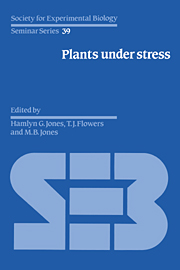Book contents
- Frontmatter
- Contents
- Contributors
- Preface
- 1 Introduction: some terminology and common mechanisms
- 2 The impact of environmental stresses on ecosystems
- 3 Whole-plant responses to stress in natural and agricultural systems
- 4 Photosynthesis and gas exchange
- 5 Regulation of growth and development of plants growing with a restricted supply of water
- 6 Stresses, membranes and cell walls
- 7 Desiccation injury, anhydrobiosis and survival
- 8 Molecular biology: application to studies of stress tolerance
- 9 Environmental control of gene expression and stress proteins in plants
- 10 Plant tissue and protoplast culture: applications to stress physiology and biochemistry
- 11 Breeding methods for drought resistance
- 12 Selection for physiological characters – examples from breeding for salt tolerance
- 13 Prospects for improving crop production in stressful environments
- Index
10 - Plant tissue and protoplast culture: applications to stress physiology and biochemistry
Published online by Cambridge University Press: 16 March 2010
- Frontmatter
- Contents
- Contributors
- Preface
- 1 Introduction: some terminology and common mechanisms
- 2 The impact of environmental stresses on ecosystems
- 3 Whole-plant responses to stress in natural and agricultural systems
- 4 Photosynthesis and gas exchange
- 5 Regulation of growth and development of plants growing with a restricted supply of water
- 6 Stresses, membranes and cell walls
- 7 Desiccation injury, anhydrobiosis and survival
- 8 Molecular biology: application to studies of stress tolerance
- 9 Environmental control of gene expression and stress proteins in plants
- 10 Plant tissue and protoplast culture: applications to stress physiology and biochemistry
- 11 Breeding methods for drought resistance
- 12 Selection for physiological characters – examples from breeding for salt tolerance
- 13 Prospects for improving crop production in stressful environments
- Index
Summary
Introduction
Salinity and drought, two environmental stresses frequently found together, are major barriers to productivity of agricultural crops throughout the world. Crops exposed to these stressful environments are observed initially to have reduced growth rates. If the stress is more severe the response is manifested visually in a number of specific and recognisable symptoms, many of which are common to both salinity and drought. However, specific ion toxicity responses (e.g. marginal leaf burn) are observed in plants exposed to excess salinity. Since salinity and drought have many common responses some of the information presented in this review will be combined under the general umbrella of environmental stress.
This chapter discusses the use of tissue and protoplast culture as a means to understand better the cellular processes related to stress tolerance with the expectation that these techniques will provide alternative methods for screening germplasm and assist in identifying useful material for incorporation into crop improvement programmes. Of equal importance is the ability to compare physiological and biochemical processes of cells and protoplasts selected for stress tolerance against unselected (wild-type) lines and to relate this to genetic regulation at the molecular level.
The techniques of tissue and protoplast culture are important for application of molecular biology to genetic manipulation of plants. The field of plant pest-host interactions has been significantly advanced by the use of protoplasts and subsequent tissue culture and regeneration of pest-resistant plants (Harrison & Mayo, 1983). Somaclonal variation has provided important genetic material both for genetic studies and for selection of desired traits in plants (Scowcroft, Larkin & Brettell, 1983; Maddock & Semple, 1986).
- Type
- Chapter
- Information
- Plants under StressBiochemistry, Physiology and Ecology and their Application to Plant Improvement, pp. 181 - 196Publisher: Cambridge University PressPrint publication year: 1989
- 28
- Cited by



